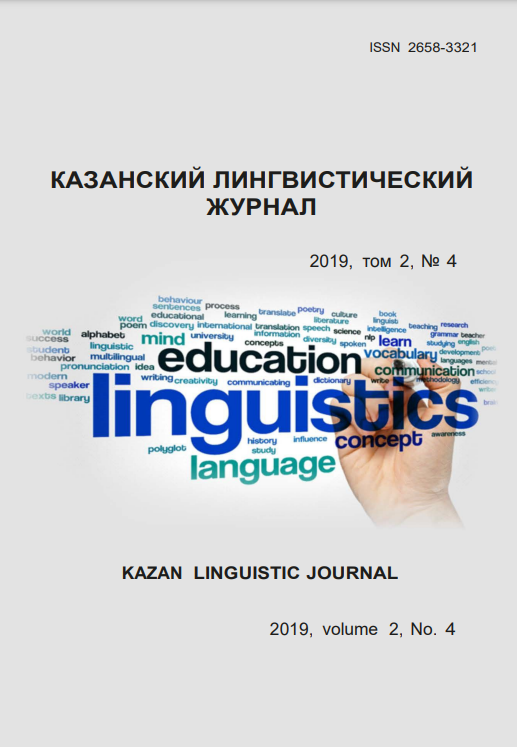Increasing the effectiveness of teaching in the institutions for in-depth learning of english
Keywords:
efficiency, development, ‘halo effect’, foreign language training, positive motivation, interdisciplinary or metasubjectlinksAbstract
The effectiveness of training is a set of skills, concepts, the ability to see the root of the cause, the establishment of causal relationships between phenomena and objects, the ability to explore and analyze the learning process, the ability to predict subsequent events, their development based on monitoring and analysis.
In recent years, interest in a foreign language has increased significantly, and English is increasingly becoming a means of international communication. And now the teacher cannot talk about the lack of interest among students to learning a foreign language, since knowledge of the language is important and meaningful, necessary in the modern world. Therefore, it is necessary to support the motivation to learn, strive to help and explain the students, engage them and overcome difficulties encountered in the process of learning. This may be gained, for example, on the base of “Halo Effect” which can psychologically influence students' motivation depending on the external setting. An experiment conducted with two groups of schoolchildren showed that the “Halo Effect” can play both a positive and a negative role in the subsequent educationalprocess: namely, the student either mobilizes all his internal resources or aims atfurther success, or everything happens exactly the opposite.
References
Литература
Андрющенко М.Н. Понятие эффективность и его философский смысл / М.Н. Андрющенко. Изд-во ЛГУ, 1971.
Бабанский Ю.К. Проблемное обучение школьников как средства повышения эффективности обучения / Ю.К. Бабанский. Ростов-на-Дону, 1970.
Бабанский Ю.О. О дидактических основах повышения эффективности обучения / Ю.О. Бабанский // Народное образование. 1986. №11. С.105 – 111.
Батурина Г.И., Байер У. Цели и критерии эффективности обучения / Г.И. Батурина, У. Байер // Советская педагогика. 1975. №4.
Беспалько В.П. Опыт разработки и использования критерия качества усвоения знаний / В.П. Беспалько // Советская педагогика. 1968. №4.
Гез Н.И. и др. Методика обучения иностранным языкам в средней школе. М.,1982
Куклина С.С. Коллективная учебная деятельности в группе на этапе формирования навыков иноязычного общения. // Иностранные языки в школе. 1998. N 5.
Маслыко Е.А., Бабинская П.К., Будько А.Ф., Петрова С.И. Настольная книга преподавателя иностранного языка. М., 1997 год.
Мильман Р.Г. Контроль уровня сформированности у обучаемых коммуникативных навыков. // Иностранные языки в школе. 1998. N 5.
Фахрутдинова А.В. Современное понимание гражданского воспитания учащихся: содержательный аспект Известия Уральского федерального университета. Серия 1: Проблемы образования, науки и культуры. 2015. Т. 141. № 3. С. 170 – 174.
Фахрутдинова А.В. Реформирование профессионального образования в Европе как условие повышения его конкурентоспособности. Ученые записки Казанской государственной академии ветеринарной медицины им. Н.Э. Баумана. 2012. Т. 210. С. 247–251
References
Andryushchenko, M.N. (1971). Ponyatie effektivnost' i ego filosofskii smysl [The concept of efficiency and its philosophical meaning] / M.N. Andryushchenko. Izd-vo LGU. (In Russian)
Babanskii, Yu.K. (1970). Problemnoe obuchenie shkol'nikov kak sredstva povysheniya effektivnosti obucheniya [Problem education of schoolchildren as a means of increasing the effectiveness of education] / Yu.K. Babanskii. Rostov- na-Donu. (In Russian)
Babanskii, Yu.O. (1986). O didakticheskikh osnovakh povysheniya effektivnosti obucheniya [About didactic bases of increase of efficiency of training] / Yu.O. Babanskii // Narodnoe obrazovanie. №11. S.105 – 111. (In Russian)
Baturina, G.I., Baier, U. (1975). Tseli i kriterii effektivnosti obucheniya [Objectives and criteria of training effectiveness] / G.I. Baturina, U. Baier // Sovetskaya pedagogika. №4. (In Russian)
Bespal'ko, V.P. (1968). Opyt razrabotki i ispol'zovaniya kriteriya kachestva usvoeniya znanii [Experience in the development and use of criteria for the quality of learning] / V.P. Bespal'ko // Sovetskaya pedagogika. №4. (In Russian)
Gez, N.I. i dr. (1982). Metodika obucheniya inostrannym yazykam v srednei shkole [Methods of teaching foreign languages in secondary school]. Moskva. (In Russian)
Kuklina, S.S. (1998). Kollektivnaya uchebnaya deyatel'nosti v gruppe na etape formirovaniya navykov inoyazychnogo obshcheniya [Collective educational activity in the group at the stage of formation of foreign language communication skills]. // Inostrannye yazyki v shkole. N 5. (In Russian)
Maslyko, E.A., Babinskaya, P.K., Bud'ko, A.F., Petrova, S.I. (1997). Nastol'naya kniga prepodavatelya inostrannogo yazyka [Table book of a foreign language teacher]. Moskva. (In Russian)
Mil'man, R.G. (1998). Kontrol' urovnya sformirovannosti u obuchaemykh kommunikativnykh navykov [Control of the level of formation of students ' communication skills]. // Inostrannye yazyki v shkole. N 5. (In Russian)
Fakhrutdinova, A.V. (2015). Sovremennoe ponimanie grazhdanskogo vospitaniya uchashchikhsya: soderzhatel'nyi aspekt Izvestiya Ural'skogo federal'nogo universiteta [Modern understanding of civic education of students: the content aspect of the proceedings of the Ural Federal University.]. Seriya 1: Problemy obrazovaniya, nauki i kul'tury. T. 141. № 3. S. 170 – 174. (In Russian)
Fakhrutdinova, A.V. (2012). Reformirovanie professional'nogo obrazovaniya v Evrope kak uslovie povysheniya ego konkurentosposobnosti [Reforming vocational education in Europe as a condition for increasing its competitiveness]. Uchenye zapiski Kazanskoi gosudarstvennoi akademii veterinarnoi meditsiny im. N.E. Baumana. T. 210. S. 247–251. (In Russian)






